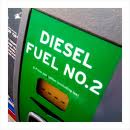What About Diesel Fuel

Diesel fuel is a petroleum product that is not as popular in the United States as it is in other countries. As a resident of the United States and a strong believer in the benefits of diesel fuels I hope that the North American continent will someday embrace this type of fuel.
One thing that can be said about diesel is that it contains more energy per gallon than gasoline and therefore can be considered more efficient. The engine that burns this type of petroleum produces much more torque at lower RPMs because of high compression chamber ratios.
This makes it a perfect choice for trucks and trains that haul heavy loads and that will require massive amounts of torque to get that load moving.
The difference between diesel and gasoline
The fuel in a gasoline engine is ignited by a spark plug. The diesel engine uses its own high combustion chamber pressure to compress the fuel until ignites on its own. Gasoline is extremely flammable compared to diesel fuel.
The flammability of gasoline is measured using the familiar octane rating. Diesel fuel also has a measured ignition quality known as the cetane rating. Much like the octane number the cetane number is measured in a single cylinder test engine with an adjustable compression ratio.
The higher the cetane rating the shorter the ignition lag time before it is ignited by the compression stroke. An average cetane rating that can be found at the pump would be around 50. Whereas the average octane rating of gasoline would be around 87 on regular grade at the pump.
Different grades of diesel fuels
 Minimum quality standards exist for diesel fuel grades. The two common grades of diesel fuel available would be number one diesel and number two. Number two is most commonly found at the fuel island in the local gas station. Number one can be blended with number two to improve starting in cold weather.
Minimum quality standards exist for diesel fuel grades. The two common grades of diesel fuel available would be number one diesel and number two. Number two is most commonly found at the fuel island in the local gas station. Number one can be blended with number two to improve starting in cold weather.
Different areas will blend the two fuels at different rates depending on how cold the climate is. The number two grade is more efficient and contains more energy. In winter months when number one is blended in it can actually reduce fuel economy.
Bio diesel fuels to me are the most interesting. These can be made from recycled restaurant grease and many different types of vegetable oils. Bio diesels fuels can be used all by themselves are blended with number one or number two grade fuels. If it can be produced cheap enough and then blended it can have very positive effects on the cost per mile.
In most cases to use a blended Bio diesel no engine modifications are required. It also does not affect the vehicles overall torque or horsepower and in turn does not reduce the vehicle’s ability to carry a payload. Research has also shown that emissions from blended Bio diesels can be lower compared to the number one and number two grade types.
As we all know the world needs to get off of fossil fuels. Solar, wind power and other cutting-edge technologies may take decades to get off the ground. Diesel fuel may be exactly what we need to bridge the gap to the future. Read more articles from this auto repair information blog. Or this next link will provide a bridge to more information about alternative fuels.


